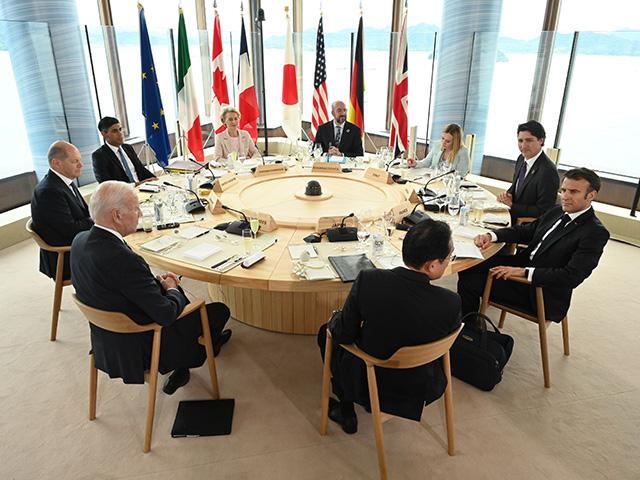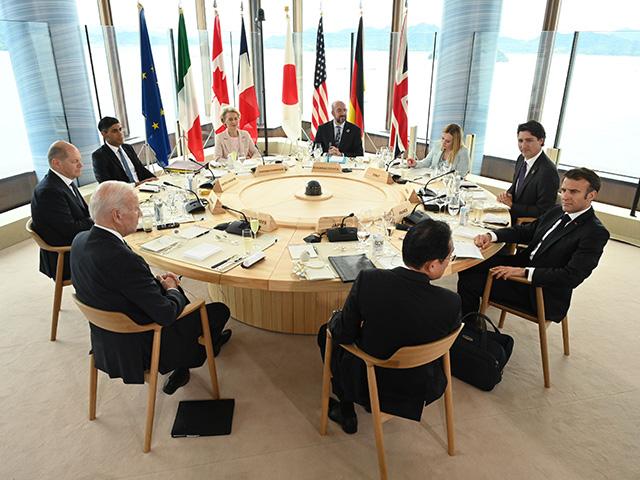An Urban's Rural View
To Decouple, or To De-Risk? That Is The Question
As often happens in diplomacy, the communique the G7 leaders issued in May from their meeting in Hiroshima ducked a key question: What is the difference between "de-risking," which the communique expressed approval of, and "decoupling," which it disapproved?
The G7 statement didn't define those terms. It didn't even mention that the foremost object of both decoupling and de-risking is China. That's diplomacy for you.
The leaders of the seven countries (the United States, the United Kingdom, Canada, Japan, Germany, France and Italy) simply said they were coordinating their approaches to economic resilience and economic security "based on diversifying partnerships and de-risking, not decoupling." (https://www.whitehouse.gov/…)
As often happens in diplomacy, the vagueness was intentional. It conveniently papered over differences between the U.S. and some of its allies. "Economic resiliency" and "economic security" are diplo-speak for avoiding overreliance on China (and to some extent Russia) for key products and avoiding supplying those countries with strategically sensitive technologies.
On the surface, decoupling (the trendy word until recently) implies taking separation from China further than de-risking (the European Commission president's word). De-risking suggests diversifying, ending exclusive reliance on China, rather than withdrawal.
In practice, though, much of the decoupling to date has also been diversification. For communique purposes, the difference between decoupling and de-risking is semantics. That's why the U.S. could agree to the communique even though there are real differences between the U.S. and its allies in their concerns about reliance on China.
Those differences reflect their differing geopolitical situations, especially with regard to Taiwan. A Chinese military attack on the island seems increasingly possible -- possible enough that U.S. officials have to plan for it even as they pray it never happens.
P[L1] D[0x0] M[300x250] OOP[F] ADUNIT[] T[]
Washington's allies don't. In the event of an attack, Japan could end up supporting the U.S., at least logistically. It's a prisoner of its history and geography. The European allies would be far less inclined to see an attack on Taiwan as their problem. They might be cajoled into joining a coalition of the willing, but that is far from guaranteed.
The U.S., then, has greater reason to worry about providing China with technologies that strengthen it militarily. It has more serious fears of being cut off by China from critical products during hostilities.
When governments are planning for war, national security ranks higher in their concerns than economic efficiency. This can be a hard swallow for those who believe, as many in exporting sectors like agriculture do, that financial markets allocate capital more efficiently than governments and free trade produces the best economic outcomes.
But it explains why some Republican believers in free markets have voted for Biden administration industrial-policy initiatives. And why Republicans are solidly behind the Biden administration's stepped-up efforts to block exports of the most advanced semiconductor technologies to China, despite warnings from U.S. high-tech companies that restrictions will have long-term economic consequences.
European countries share some of the same concerns about China as the U.S., but they're nowhere near as worried about national security. Referring to Taiwan, French President Emmanuel Macron has warned Europe not to get "caught up in crises that are not ours." https://www.politico.eu/…
Europeans are displeased with the Biden administration's high-tech subsidies and buy-American rules, which they see as drawing investment away from them as much as from China. Some Europeans are also leery of U.S. efforts to block exports of high-tech products to China. The Dutch government, however, eventually went along with the U.S. and restricted Dutch companies' exports of the most advanced semiconductor manufacturing equipment to China. (https://www.cnbc.com/…)
Europe, in sum, prefers "de-risking" because it doesn't want as much economic separation from China as the U.S. The Biden administration accepted "de-risking" because it's sufficiently vague to let allies march to different drummers.
Actually, so is decoupling. For all the talk of it over the last few years, for all the government's industrial-policy moves, for all its export restrictions, for all the announcements by companies of plans to move manufacturing back to the U.S. or to Asian countries other than China, U.S.-China trade in goods set a record in 2022, as did U.S. exports to China. (https://www.cnn.com/…)
U.S. ag exports to China also set a record in fiscal 2022 at $36.4 billion. (https://www.fas.usda.gov/….
Though the U.S. and China are rivals, American companies' supply chains are deeply imbedded in China. China is the largest trading partner of the U.S. and of about 120 countries, including American allies like Japan, South Korea and Germany.
China has dominant world market share in some product lines, like drones and solar panels, and is a critical supplier of countless thousands of others. In a war, China would unquestionably cut off exports to the U.S., which makes it logical to decrease reliance on China.
But short of war, how far disentangling today's supply chains can or will go is unclear, regardless of which diplomatic euphemism is used to describe it.
Urban Lehner can be reached at urbanize@gmail.com
(c) Copyright 2023 DTN, LLC. All rights reserved.






Comments
To comment, please Log In or Join our Community .